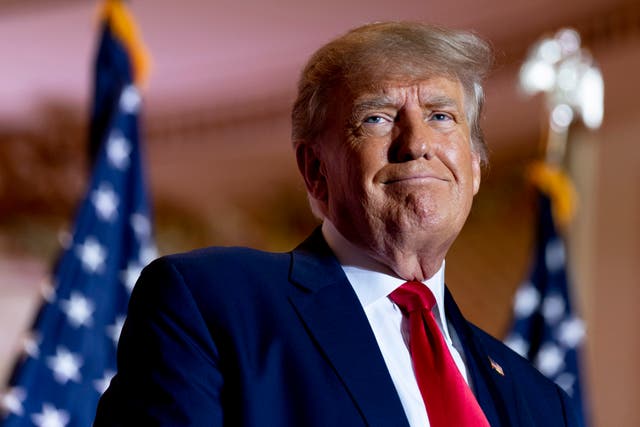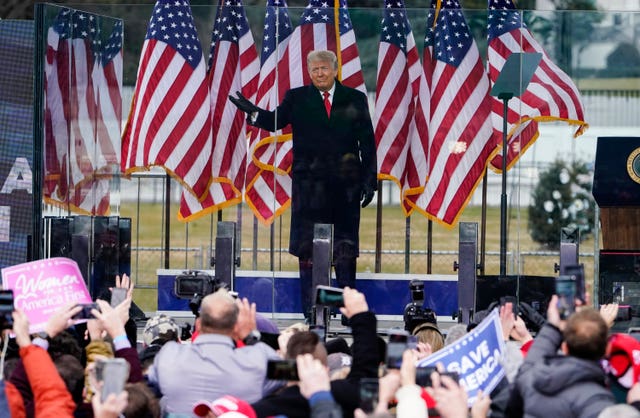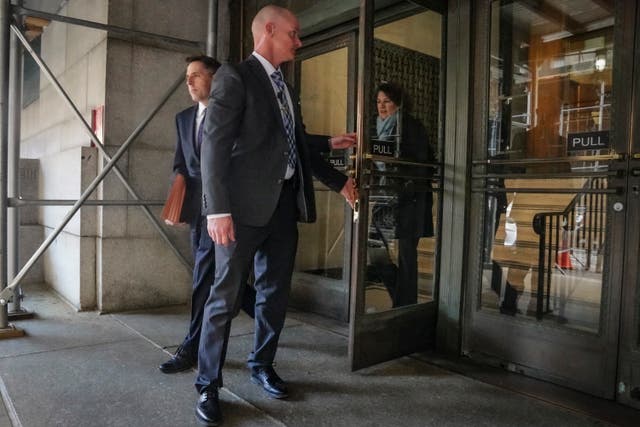
A Manhattan grand jury has voted to indict Donald Trump on charges involving payments made during the 2016 presidential campaign to silence claims of an extramarital sexual encounter.
It is the first ever criminal case against a former US president and a jolt to Mr Trump’s bid to retake the White House in 2024.
Mr Trump, who has denied any wrongdoing and has repeatedly attacked the investigation, called the indictment “political persecution” and predicted it would damage Democrats in 2024.
The indictment is an extraordinary development after years of investigations into his business, political and personal dealings.
It is likely to galvanise critics who say Mr Trump lied and cheated his way to the top and embolden supporters who feel the Republican is being unfairly targeted by a Democratic prosecutor.
READ MORE: Why is Donald Trump saying he is going to be arrested?
In a statement, his lawyers, Susan Necheles and Joseph Tacopina, said: “He did not commit any crime. We will vigorously fight this political prosecution in court.”
The district attorney’s investigation centred on money paid to adult film star Stormy Daniels and former Playboy model Karen McDougal, whom he allegedly feared would go public with claims that they had extramarital sexual encounters with him.
Mr Trump, who has denied any wrongdoing and has repeatedly attacked the investigation as politically motivated, was expected to surrender to authorities next week, though the details were still being worked out, according to a person familiar with the matter who was not authorised to discuss a matter that remained under seal.
In bringing the charges, the Manhattan district attorney, Alvin Bragg, is embracing an unusual case that had been investigated by two previous sets of prosecutors, both of which declined to take the politically explosive step of seeking Mr Trump’s indictment.
In the weeks leading up to the indictment, Mr Trump railed about the investigation on social media and urged supporters to protest on his behalf, prompting tighter security around the Manhattan criminal courthouse.
Mr Trump faces other potential legal perils as he seeks to reassert control of the Republican Party and stave off a slew of one-time allies who are seeking or are likely to oppose him for the presidential nomination.
The district attorney in Atlanta has for two years been investigating efforts by Mr Trump and his allies to meddle in Georgia’s 2020 vote count.
 Former US president Donald Trump (Andrew Harnik/AP)
Former US president Donald Trump (Andrew Harnik/AP)
And a US Justice Department special counsel is investigating Mr Trump’s storage of classified documents at his Mar-a-Lago home in Florida and his efforts to reverse his election loss.
The fate of the hush money investigation seemed uncertain until word got out in early March that Mr Bragg had invited Mr Trump to give evidence before a grand jury, a signal that prosecutors were close to bringing charges.
Mr Trump’s lawyers declined the invitation, but a lawyer closely allied with the former president briefly gave evidence in an effort to undercut the credibility of Mr Trump’s former lawyer and fixer Michael Cohen.
Late in the 2016 presidential campaign, Cohen paid Ms Daniels 130,000 dollars to keep her silent about what she says was a sexual encounter with Mr Trump a decade earlier after they met at a celebrity golf tournament.
Cohen was then reimbursed by Mr Trump’s company, the Trump Organisation, which also rewarded the lawyer with bonuses and extra payments logged internally as legal expenses.
Over several months, Cohen said, the company paid him 420,000 dollars.
Earlier in 2016, Cohen had also arranged for the publisher of the supermarket tabloid the National Enquirer to pay Playboy model Karen McDougal 150,000 dollars to squelch her story of a Trump affair in a journalistically dubious practice known as “catch-and-kill”.
The payments to the women were intended to buy secrecy, but they backfired almost immediately as details of the arrangements leaked to the news media.
 Former US president Donald Trump (Jacquelyn Martin/AP)
Former US president Donald Trump (Jacquelyn Martin/AP)
Federal prosecutors in New York ultimately charged Cohen in 2018 with violating federal campaign finance laws, arguing that the payments amounted to impermissible help to Mr Trump’s presidential campaign.
Cohen pleaded guilty to those charges and unrelated tax evasion counts and served time in federal prison.
Mr Trump was allegedly implicated in court filings as having knowledge of the arrangements, but US prosecutors at the time baulked at bringing charges against him.
The Justice Department has a longtime policy that it is likely unconstitutional to prosecute a sitting president in federal court.
READ MORE: Trump’s Scottish golf courses post losses of £15m
Mr Bragg’s predecessor as district attorney, Cyrus Vance Jr, then took up the investigation in 2019.
While that probe initially focused on the hush money payments, Mr Vance’s prosecutors moved on to other matters, including an examination of Mr Trump’s business dealings and tax strategies.
Mr Vance ultimately charged the Trump Organisation and its chief financial officer with tax fraud related to fringe benefits paid to some of the company’s top executives.
The hush money matter became known around the DA’s office as the “zombie case”, with prosecutors revisiting it periodically but never opting to bring charges.
Mr Bragg saw it differently.
After the Trump Organisation was convicted on the tax fraud charges in December, he brought fresh eyes to the well-worn case, hiring longtime white-collar prosecutor Matthew Colangelo to oversee the probe and convening a new grand jury.
 Prosecutors Matthew Colangelo, left, and Susan Hoffinger, right, leave a state office building in New York (Bebeto Matthews/AP)
Prosecutors Matthew Colangelo, left, and Susan Hoffinger, right, leave a state office building in New York (Bebeto Matthews/AP)
Cohen became a key witness, meeting with prosecutors nearly two dozen times, turning over emails, recordings and other evidence and giving evidence before the grand jury.
Mr Trump has long decried the Manhattan investigation as “the greatest witch hunt in history”.
He has also lashed out at Mr Bragg, calling the prosecutor, who is black, racist against white people.
The criminal charges in New York are the latest salvo in a profound schism between Mr Trump and his home town – a reckoning for a one-time favourite son who grew rich and famous building skyscrapers, hobnobbing with celebrities and gracing the pages of the city’s gossip press.
Mr Trump, who famously riffed in 2016 that he “could stand in the middle of Fifth Avenue and shoot somebody” and “wouldn’t lose voters”, now faces a threat to his liberty or at least his reputation in a borough where more than 75% of voters – many of them potential jurors – went against him in the last election.



Why are you making commenting on The Herald only available to subscribers?
It should have been a safe space for informed debate, somewhere for readers to discuss issues around the biggest stories of the day, but all too often the below the line comments on most websites have become bogged down by off-topic discussions and abuse.
heraldscotland.com is tackling this problem by allowing only subscribers to comment.
We are doing this to improve the experience for our loyal readers and we believe it will reduce the ability of trolls and troublemakers, who occasionally find their way onto our site, to abuse our journalists and readers. We also hope it will help the comments section fulfil its promise as a part of Scotland's conversation with itself.
We are lucky at The Herald. We are read by an informed, educated readership who can add their knowledge and insights to our stories.
That is invaluable.
We are making the subscriber-only change to support our valued readers, who tell us they don't want the site cluttered up with irrelevant comments, untruths and abuse.
In the past, the journalist’s job was to collect and distribute information to the audience. Technology means that readers can shape a discussion. We look forward to hearing from you on heraldscotland.com
Comments & Moderation
Readers’ comments: You are personally liable for the content of any comments you upload to this website, so please act responsibly. We do not pre-moderate or monitor readers’ comments appearing on our websites, but we do post-moderate in response to complaints we receive or otherwise when a potential problem comes to our attention. You can make a complaint by using the ‘report this post’ link . We may then apply our discretion under the user terms to amend or delete comments.
Post moderation is undertaken full-time 9am-6pm on weekdays, and on a part-time basis outwith those hours.
Read the rules hereLast Updated:
Report this comment Cancel